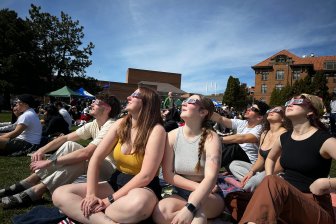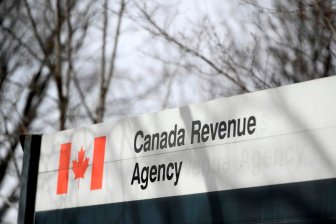55% of Calgarians believe city is ‘on the wrong track’: poll – Calgary | Globalnews.ca
[ad_1]
More than half of Calgarians believe the city is “on the wrong track,” a recent Leger poll suggests.
According to a report published on Friday, 55 per cent of Calgarians surveyed believe the city is on the wrong track, compared with 37 per cent who said they believe the city is headed in the right direction.
Housing prices and affordability were cited as the top issue Calgary is facing by 26 per cent of those surveyed, followed by property taxes (14 per cent) and the economy (12 per cent).
“There should be a limit (on rent) or something. Rent is out of control. It’s impossible to live by yourself,” Calgary resident Rayne Kalinowski told Global News.
Out of the 451 people surveyed, 37 per cent gave Mayor Jyoti Gondek a low score when it comes to handling their top issue. About 50 per cent gave Gondek a mid-range score, while only 14 per cent said they were satisfied by the way the mayor has handled their top issue.
The majority of survey respondents said they believe Gondek has done a “bad job” rather than a “good job” when it comes to addressing issues Calgary is facing, with the exception being alternative transportation (bike lanes and walking paths).
Calgary resident Carole MacDonald said she isn’t pleased with council but acknowledged that Gondek and councillors have a tough job.
“I don’t think (council is) doing a great job but when was there a good job? They are few and far between. You’ll have to go back to the days of Ralph Klein,” she told Global News.
“That’s not a great result. If you’re the government, I think you’d be a bit concerned,” said Andrew Wenns, executive vice president of Leger Research in central Canada.
“When we dug a bit deeper in terms of what are some of the issues that Calgarians are sort of most focused on, I think we saw some things that you’d expect, like housing affordability, topping the list. I think you’ll also see some things in there that the municipal government probably has a bit more control over, like property taxes and the homelessness issue.
“Calgarians are feeling that maybe their city’s not firing on all cylinders on that front.”
Wenns said, however, that a lot of the issues are not entirely solvable on the municipal level. The poll will provide information about what issues are important for their residents and the opportunities to tackle them.
“Some of these issues aren’t solvable by the mayor and council … You take a look at an issue like homelessness and you need to have a pretty good partnership with some of the other folks like the provincial government,” Wenns said.

Majority of those who voted for Gondek won’t again
The Leger report said around 24 per cent of those surveyed voted for Gondek in the 2021 Municipal Election election. If a municipal election was held tomorrow, only 11 per cent of those voters would vote for her again while 54 per cent of those voters said they would vote for someone else.
The report also said 77 per cent of those surveyed were aware of the recall petition against Gondek that was submitted to Elections Calgary on Thursday, April 4. Fifty-eight per cent of respondents said they were informed on the campaign.
“It’s not a really good endorsement of a job well done … She hasn’t been there for a long time. Typically, you get a little bit of (leeway), you have a bit of political capital, a little bit of a honeymoon, but I suspect that she’s kind of gone through that fairly quickly,” Wenns said.
“We focus on the mayor, but I think council has to be a little cautious about some of the numbers because the mayor takes a lot of the attention. If this translates into the next election of a movement that we need wholesale change, like we got to get some fresh thinking, I can tell you some councillors can get caught up in that current pretty quickly.”
However, 47 per cent of respondents said they supported the campaign compared with the 32 per cent who opposed it. Only 29 per cent of Calgarians who responded to Leger’s survey signed or intended to sign the recall petition.
Around 42 per cent of respondents said they agreed with the statement saying, “If you did not vote in the last municipal election, you should not be able to sign the ‘Recall Gondek’ petition.” Thirty-two per cent of those surveyed said they don’t agree with the statement while 14 per cent said they neither agree nor disagree.
“The support for the recall didn’t automatically match up to the impressions that people were supportive of the mayor’s performance … It wasn’t necessarily that people were supportive of her and opposed to the recall, but there was a sizable portion that was undecided,” Wenns said.
“In this case, (the recall petition) was kind of partisan. Even though there’s no partisanship at the municipal level, there’s a sort of a partisan slant … You may find some that were maybe opposed to it but not necessarily because they were endorsing the mayor but they’re prepared to exercise their opinions at the ballot box and are willing to wait.”

Is it possible to be re-elected?
Wenns said he isn’t sure if things can turn around for Gondek and council because issues like housing and affordability aren’t quick fixes, but it’s not impossible.
“I do think in municipal politics that because it’s so local, and in many cases it’s very service specific, you can make a bit of progress on some of these things that you can get some credit for, and maybe turn things around,” he said.
However, Wenns said the public is generally less charitable to people in leadership positions and that’s reflected in the survey results. It’s important for councillors and Gondek to address these concerns if they want to be re-elected.
“I think it is challenging in the municipal environment because it’s not like the mayor can go on a caucus retreat or have a cabinet meeting and try to rally sort of like-minded people and set a new agenda. It’s a bit of herding cats, some days in city council,” Wenns said.
“From a strategic perspective, I think there just needs to be a look at some of these issues. And maybe it’s not all of them. But look at a couple where you think that there are some areas where you can make some progress. Maybe you have to look at what’s possible with the provincial government in terms of some areas where you can you can collaborate, I think that would go a long way on some of these issues.
“If they don’t get some resolution, you’ll have a harder time getting re-elected.”
In an interview with Global News, Gondek said she hears residents’ concerns and the City has been addressing housing, taxes and economic issues for the past two years.
She said she is concerned that Calgarians are “not getting their fair share” from the provincial and federal governments, which led to the City having to raise property taxes to fund infrastructure projects such as transit and affordable housing.
“The concern that Calgarians have about their property taxes is one that I share. And frankly, if we weren’t having to invest so heavily into housing, into public safety and into transit without the solid partnerships that we need from both the provincial and federal governments, property taxes wouldn’t have to rise the way that they have,” she told Global News Monday.
“And when it comes to the economy, when Calgary is doing well, there’s a lot of income tax that goes to both the federal and provincial governments. It does not come to the local government. We rely heavily on getting those dollars back for Calgarians and we simply don’t get them. So I would say that this council and Calgarians are completely in line with what we see as concerns.”
Gondek said Calgarians look up to council for leadership and advocacy, especially on issues like housing, mental health and addiction even though they aren’t solely municipal responsibilities. She said council “cares deeply about quality of life for Calgarians” and is committed to making investments in essential services, but she wants the provincial and federal governments to do more.

The City has partnered with public, private and non-profit organizations to build more housing, improve public safety and create a coordinated response during a crisis situation, Gondek added.
“You cannot benefit from the growth in this city, the economic success of the city and not give something back to us. And so we will continue to advocate for that, and we will continue to be the order of government that takes care of Calgarians,” the mayor said.
“So we’re better when we work together, and we are much more effective when we understand what role needs to be played in each situation.”
Gondek didn’t say whether she will seek re-election but did say she isn’t focused on the 2025 municipal election.
“If I was worried about the next election, I wouldn’t be doing my job right now. I am incredibly focused right now on the implementation phase of the housing strategy. I’m incredibly focused right now on figuring out how we deliver a fair budget to Calgarians by getting the funding we need from both the provincial and federal governments. All of that work consumes my time,” she said.
“Calgarians are in a very difficult place right now, and we need to help get them back on track. We need to make sure our economy stays strong. Those are the things we need to be focused on. And for members of council who are distracted by an election, that’s not doing your job.”
Leger’s online poll surveyed 451 Calgary residents aged 18 or older. For comparison purposes, a probability sample size of 451 yields a margin of error of no greater than 4.61 per cent, or 19 times out of 20 for the total sample. Leger said the results were weighted according to age, gender and education to ensure a “representative sample” of the Calgary population.
[ad_2]
Read More:55% of Calgarians believe city is ‘on the wrong track’: poll – Calgary | Globalnews.ca




Comments are closed.